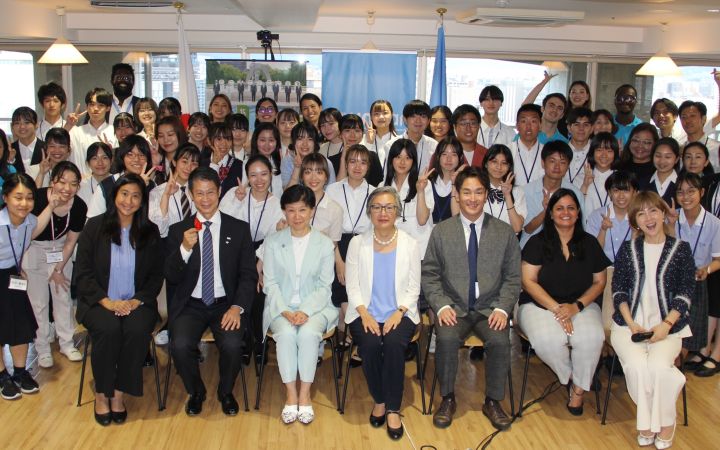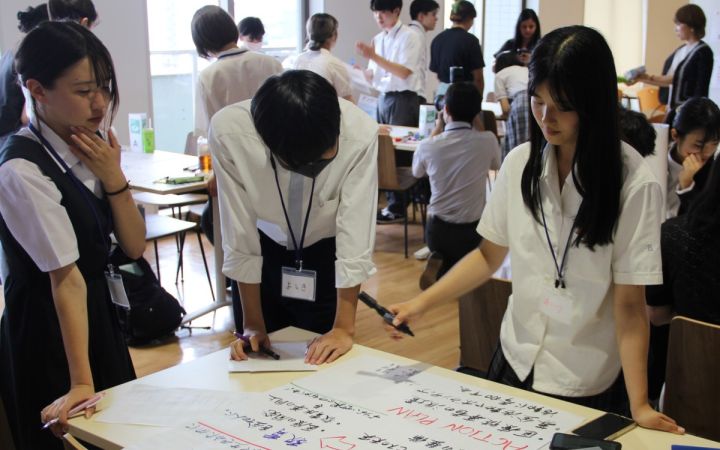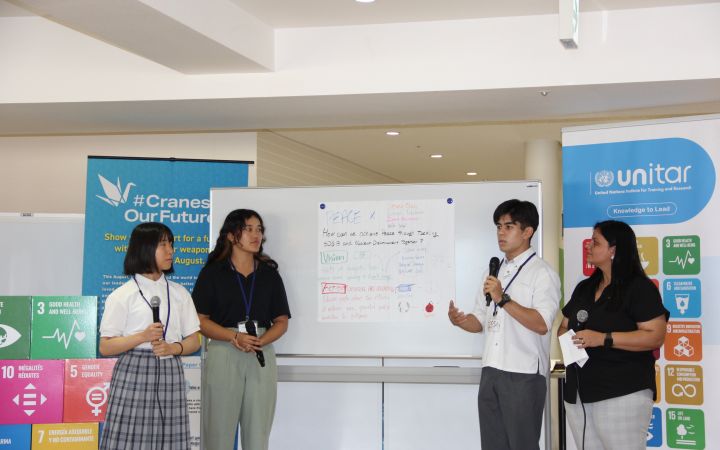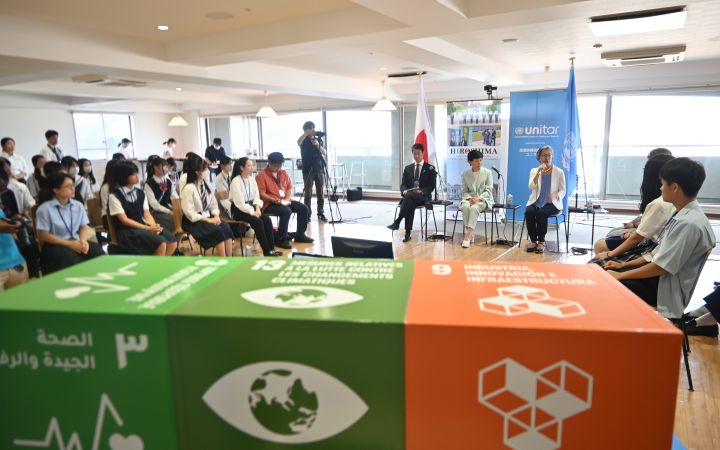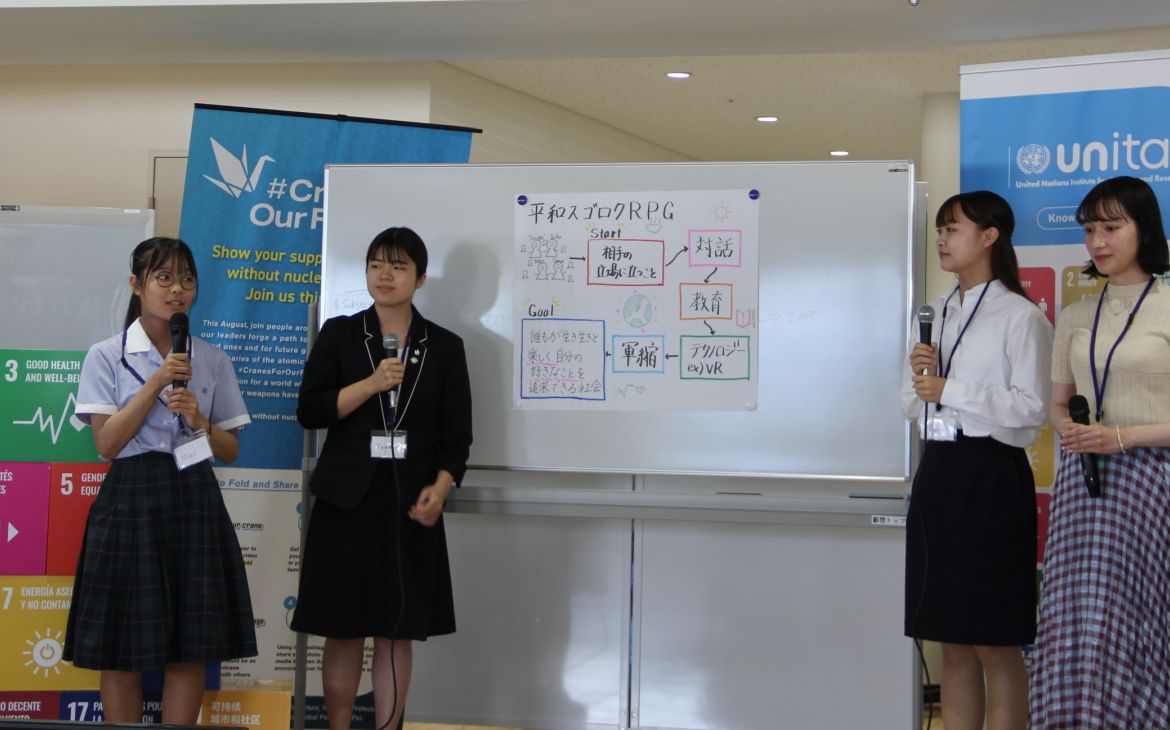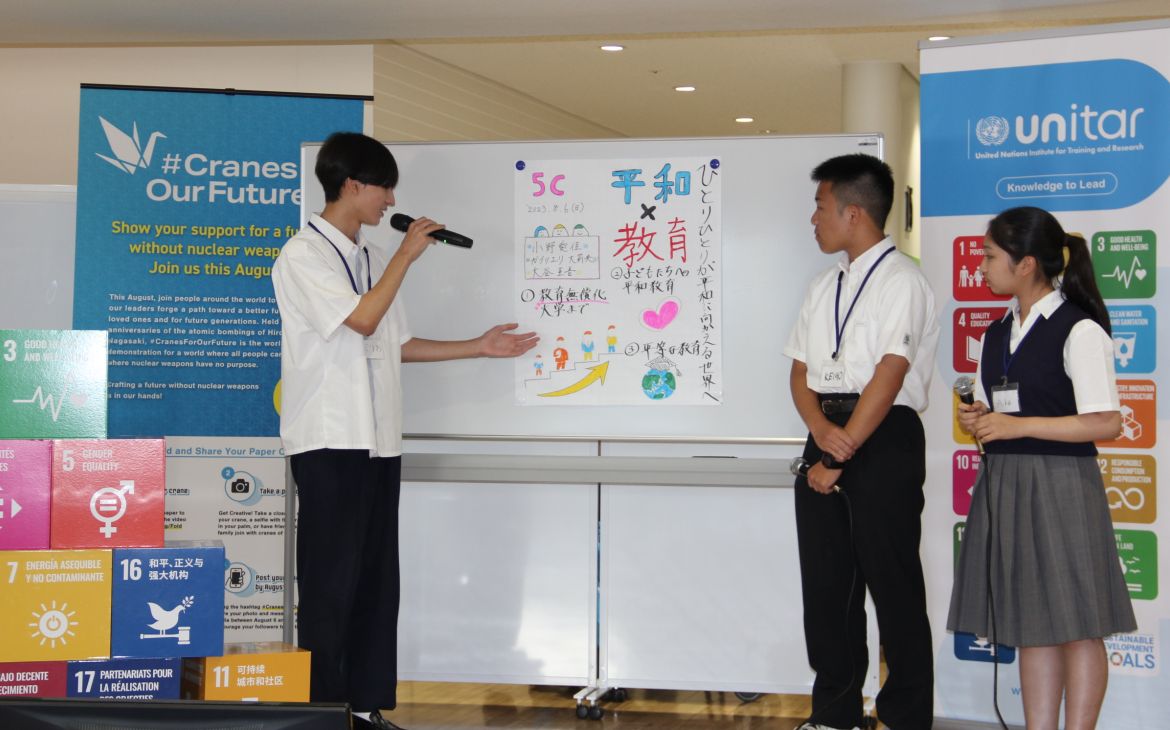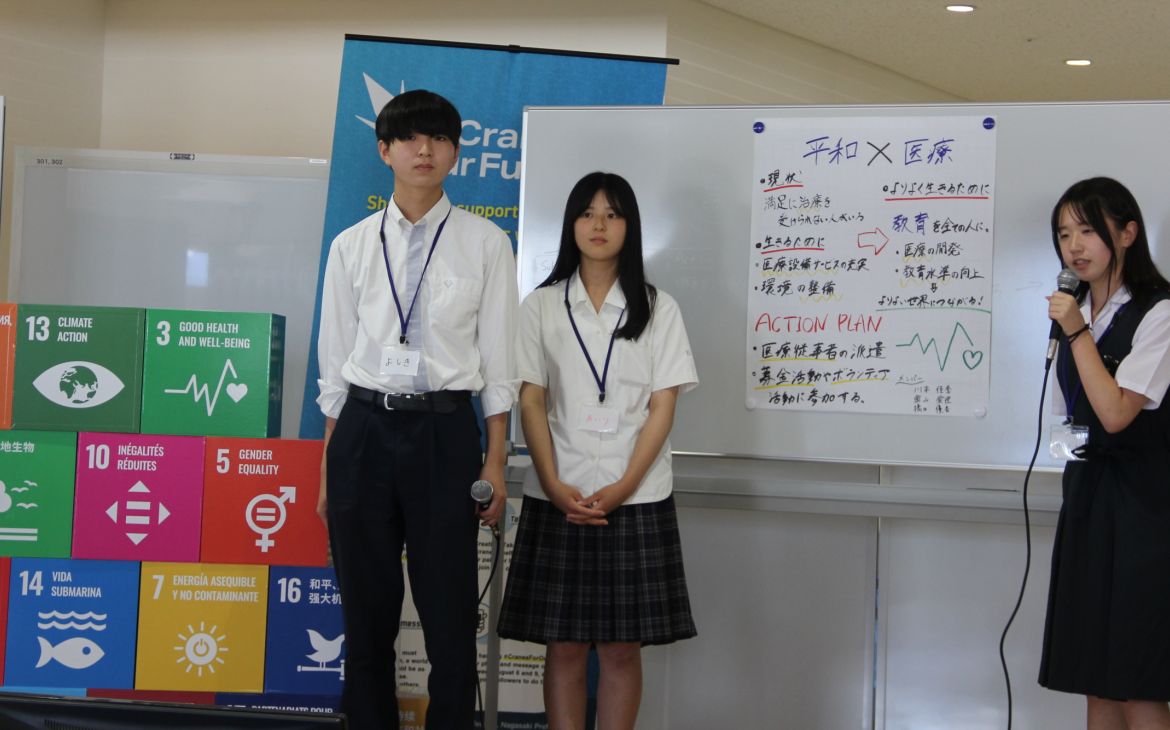- On 6 August 2023, UNITAR held a public youth pitch event “‘Peace & XX’ Ideation – Nuclear Disarmament and Sustainable Futures” in Hiroshima.
- 39 youth living in Japan held discussions on nuclear disarmament and non-proliferation and a sustainable future and select teams presented their ideas to expert panellists for their feedback.
- Expert panelists congratulated all participants for the fruitful discussions and presentations and for taking the first step to realizing a sustainable future and stressed the importance of youth to continue to act and to disseminate messages to realize their ideal and sustainable future.
11 August 2023, Hiroshima, Japan – On 6 August 2023, the United Nations Institute for Training and Research (UNITAR) held a public youth pitch event “‘Peace & XX’ Ideation – Nuclear Disarmament and Sustainable Futures” at Eikei University in Hiroshima. Youth living in presented their ideas in groups on nuclear disarmament and non-proliferation for a sustainable future based on given sustainable development goals (SDGs) to expert panellists for their feedback.
The panellists were Ms Izumi NAKAMITSU, United Nations Under-Secretary-General and High Representative for Disarmament Affairs, Mr Hidehiko YUZAKI, Governor of Hiroshima Prefectural Government and President of Hiroshima for Global Peace, and Ms Mihoko KUMAMOTO, Director of the UNITAR Division for Prosperity and Hiroshima Office. Mr. Kenta SUMIOKA, Vice-Chair of Peace Culture Village supported as the facilitator of the event and Ms. Kumiko MORIMOTO, freelance announcer as the emcee.
The final presentations were live-streamed in English and Japanese for youth around the world.
SESSION 1 (12:00pm-16:00pm, JST)
39 youth gathered to pitch ideas in groups of three to four members (12 groups in total) for ideas on nuclear disarmament and non-proliferation and realizing of a sustainable future. They were given a goal; SDGs 3-Good health and well-being, 5-Gender equality, 9- Industry, innovation and infrastructure, or 13-Climate action for their presentation. After conducting extensive discussion, they pitched ideas in groups and chose amongst themselves the top four teams to move on to the next session for the final presentation to expert panellists.
Through the support of the facilitator and volunteers from the Peace Culture Village, each team imaged the world after twenty years. The youth considered what kind of actions they needed to take at the global, national, and grassroots levels to achieve that ideal future. Each participant actively exchanged and discussed ideas with the team members and built a unique group presentation. After listening to other teams present, each group selected one group representative for the second session.
SESSION 2 (16:30-18:00pm, JST)
Livestreamed video in English and Japanese.
The top four groups participated in the second session to present their ideas on a sustainable future to expert panellists.
Group 1: SDG 3 - Good health and well-being
- The group proposed that the Government can contribute by dispatching medical professionals to countries and taking issues to a personal level to contribute by volunteering, donating and interacting with youth around the world to develop ideas to achieve this goal. They also emphasized the importance of people receiving education to understand the importance of good health and well-being.
Group 2: SDG 9 - Industry, innovation, and infrastructure
- The group noted the importance of first understanding each other and accepting differences, holding dialogues to discuss differences, receiving proper education and thinking of peace not just from the perspective of nuclear disarmament but from different angles to contribute to peace. For technology, they proposed the use of current technology to connect to people around the world and to further expand on the use of technology to re-create in a virtual manner of tragedies so that history does not repeat itself.
Group 3: SDG 13 - Climate action
- The group presented their idea to convert military spending to spending to tackle environmental issues and to solve issues in a manner of holding dialogues rather than by military and economic power. They also stressed the importance of all children receiving peace education and the dissemination of peace messages through education so that youth can act.
Group 4: SDG 5 - Gender equality
- The members first focused on education for all by proposing free education up until university. This will enhance the level of understanding of the people of the country. Also, they emphasized the importance of having children receive peace education throughout the country. In terms of gender equality, they stressed that receiving education to understand the importance of gender equality is important.
Summary of the feedback from expert panellists
This is an important event that incorporates an advanced method called strategic foresight where one envisions an ideal future and take approaches to realize this future. The United Nations has also adopted it, and I was very encouraged by the fact that you had discussions with this approach. Please continue this foresight and spread the learnings to the people around you. - Ms. Izumi NAKAMITSU, United Nations Under-Secretary-General and High Representative for Disarmament Affairs.
It is important to analyse the cause, formulate hypotheses, and solve issues. The term education was key in many presentations, and I agree education is particularly important. Education is important to become free of bias which hinders solving many issues. Another crucial point raised was conducting dialogues among countries. Even if it may seem time consuming, we should try to solve issues through dialogues. I was extremely impressed and encouraged by the presentations. - Mr. Hidehiko YUZAKI, Governor of Hiroshima Prefectural Government and President of Hiroshima for Global Peace
We tend to think that "to study" means to go to school and to acquire knowledge. There are many levels of learning, from acquiring knowledge, analysing, and deepening understanding, to flexibly utilizing knowledge and making proposals. Knowledge can be acquired from not only teachers, but from peers and mentors. I hope that you will continue to make friends through participation in events and to enhance knowledge and presentation skills. - Ms. Mihoko KUMAMOTO, Director of the UNITAR Division for Prosperity and Hiroshima Office
Expert panelists congratulated all participants for the fruitful discussions and presentations and for taking the first step to realizing a sustainable future. They stressed the importance of youth continuing to act and disseminating messages to realize their ideal and sustainable future.
The event was hosted by UNITAR with Hiroshima Prefectural Government / Hiroshima Organization for Global Peace (HOPe) and the United Nations Office for Disarmament Affairs (UNODA).
Recording: Peace & xx Ideation' – Nuclear Nuclear Disarmament and Sustainable Futures” (English)
Recording: Peace & xx Ideation' – Nuclear Nuclear Disarmament and Sustainable Futures” (Japanese)
About UNITAR
The United Nations Institute for Training and Research (UNITAR) is a dedicated training arm of the United Nations. In 2021, UNITAR trained 370,139 learners around the world to support their actions for a better future. In addition to our headquarters in Geneva, we have offices in Hiroshima, New York and Bonn and networks around the world.
The Division for Prosperity is based in the Hiroshima Office and Geneva. We seek to shape an inclusive, sustainable and prosperous world through world-class learning and knowledge-sharing services on entrepreneurship, leadership, finance and trade, digital technologies, and nuclear disarmament and non-proliferation. We empower individuals from least-developed countries, countries emerging from conflict, and small-island developing states – especially women and young people – to bring about positive change.


